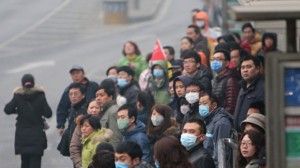
China’s worsening air pollution has exacted a significant economic toll, grounding flights, closing highways and keeping tourists at home. Photograph from STR/AFP/Getty Images
Back in November 2014, America and China joined hands to fight global climate change, including a plan to decrease China’s greenhouse gas emissions by 2020. Although there has been a lot of doubt about their plan, China has shown results. According to the China Coal Industry Association, China’s coal production decreased by 2.5% last year, marking the first reduction that the country has seen in years.
As the world’s primary emitter of greenhouse gases, the Republic of China’s decision to create new environmental policies allows China to be a global example in leading the way to reduce CO2 emissions. The global negotiations are also receiving praise because of their economic benefits. The solar power market has seen increases since November, further strengthening industrial market growth and enhancing public health.
However, a recent measure of Beijing’s Air Quality Index brings concerns about the toxic air the Chinese are breathing. Despite the country’s efforts to fight pollution, the consequences of being the world’s number one consumer of coal has caused Beijing to experience another airpocalypse just a few weeks ago. The city reached smog-levels that were, literally, off the charts.
A recent Greenpeace study stated that most cities in China are “failing to meet China’s own national standards”, regardless of the country’s initiatives to combat pollution. Additionally, a Peking University and Greenpeace study shows that more than 200 thousand Chinese could die from pollution-related diseases if there is no further caution taken by the Chinese government. The recent “airpocalypse” further raised the concerns of the Chinese government, who are more driven to push the country to continue its initiatives to combat climate change.
The city’s Air Quality Index of over 600 and new Greenpeace studies should stand to be an example to the rest of the world. The high levels of coal consumption, power plants, and fracking that China has experienced in less than a decade has proved to be dangerous. Although the country is taking action now, the effects evidently will linger for a long time. As the United States continues its high consumption of coal, building of power plants, and fracking, it is important to look at China as an example and as a reminder that we need to start taking action before it is too late.


